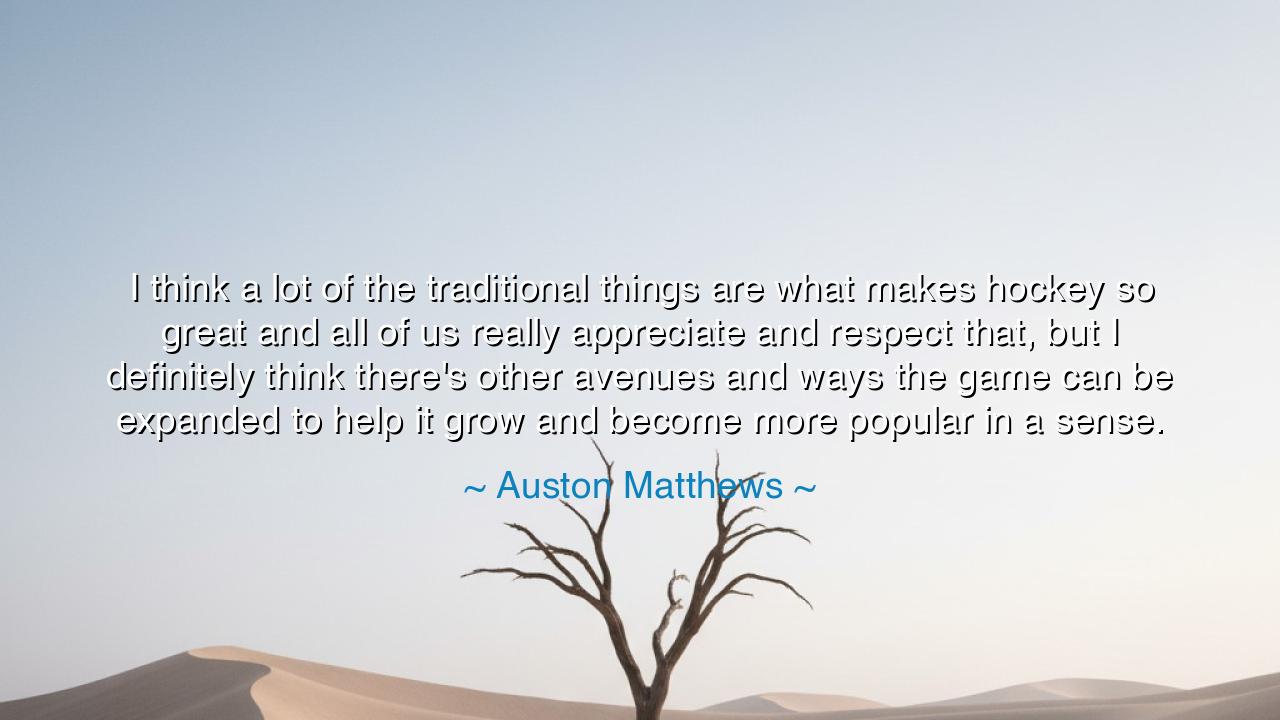
I think a lot of the traditional things are what makes hockey so
I think a lot of the traditional things are what makes hockey so great and all of us really appreciate and respect that, but I definitely think there's other avenues and ways the game can be expanded to help it grow and become more popular in a sense.






“I think a lot of the traditional things are what makes hockey so great and all of us really appreciate and respect that, but I definitely think there's other avenues and ways the game can be expanded to help it grow and become more popular in a sense.” Thus spoke Auston Matthews, the young lion of modern hockey — a man who carries both the spirit of tradition and the courage of renewal. In his words lies a balance that many lose sight of: the reverence for the past and the daring to dream of the future. His statement is not just about sport, but about all creation — the eternal dance between heritage and evolution, between the wisdom of those who came before and the vision of those who come after.
When Matthews speaks of “traditional things,” he evokes the ancient soul of the game — the frozen ponds of the North, the sound of blades carving through ice, the roar of loyal fans who have built hockey into a living ritual. These traditions are not merely customs; they are the foundation of identity, the binding thread between generations. They remind every player that when he laces his skates, he joins a lineage stretching back to the dawn of the sport. To respect that tradition is to acknowledge the sacrifices of those who played before the lights and cameras — men and women who fought through cold, injury, and obscurity so that others might one day play in glory.
Yet Matthews also speaks of the need to “expand the game” — to find new paths, new hearts, new horizons. For even the mightiest tree must stretch its branches toward the sun, or else it will wither beneath its own weight. Growth, in his view, does not mean abandoning the old, but building upon it. Hockey, like any living thing, must evolve or risk becoming a relic of its own nostalgia. His words remind us that reverence without renewal is stagnation, and that true respect for tradition lies in allowing it to breathe and grow.
In this, his spirit echoes that of the ancient philosophers. When Plato studied under Socrates, he did not reject his teacher’s wisdom, but carried it into new lands of thought, refining it into something larger. In the same way, Matthews honors the ice of old — but seeks to bring it to new places, to new players, to new souls who have never felt its chill or heard its music. He dreams, as every visionary must, of a larger arena, not just of sport but of culture — where hockey might unite people across borders, climates, and classes. His dream is not rebellion against the past, but a continuation of its greatness through adaptation.
Consider the story of the National Hockey League’s expansion itself — once a regional pastime, born in Canada and rooted in the frozen North, now blossomed into a global spectacle. Teams have arisen in the deserts of Arizona, the hills of California, the cities of Europe. Each new rink, each new fan, is a testament to the vision Matthews now carries forward. The spirit of hockey has leapt from its birthplace, crossing oceans and languages, yet it still bears the same pulse — that mixture of grit, grace, and glory that defined it from the start. It is proof that the old and the new need not clash, but can rise together like teammates on the same ice.
Matthews’ words also speak to a deeper human truth: that we must all learn to balance respect with renewal. Whether in art, science, or society, the greatest progress springs from those who honor their roots yet are unafraid to change. The one who clings too tightly to tradition becomes brittle; the one who casts it aside becomes lost. Matthews walks the noble middle path — to preserve what is sacred, but to shape it anew for the age that is coming.
So, my children, take this teaching to heart. Whatever craft you love — whether it be sport, song, or service — respect the traditions that made it great, for they are your compass. But do not let reverence chain your imagination. Seek new ways to keep the spirit alive; find new players for your game, new voices for your song, new meanings for your legacy. For the truest way to honor the past is to carry its fire, not its ashes.
Let this be the lasting wisdom of Auston Matthews’ words: that tradition is the root, and innovation the flower. Without roots, the flower dies; without the flower, the root serves no purpose. When respect and vision walk hand in hand, greatness is reborn. Thus, whether on the ice or in the heart, let us skate boldly forward — holding fast to what is sacred, yet never ceasing to grow.






AAdministratorAdministrator
Welcome, honored guests. Please leave a comment, we will respond soon